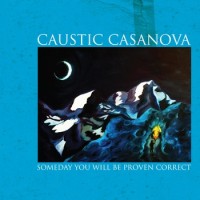Somewhere after the break up of Bauhaus and the rise of Gene Loves Jezebel and Dead Can Dance, goth music became synonymous with ambient, drifting and forlorn sounds. That is to say, the general consensus of goth music was that it was wimpy. In a way, it's unfortunate that goth became associated with such a tag because the founders and forefathers of the genre had some nasty, muscular guitars, such as Bernard Sumner, Daniel Ash, Robert Smith and even the mighty Tony Iommi. While Caustic Casanova do not explicitly refer to themselves as goth, they use many of the trappings of the genre including macabre lyrics, wailed vocals and a general sense of dread. But, in lieu of wispy ambiance, the band drives their music forward with classic rock/hard blues rock riffage which gives the music distinction but also, somewhat clouds up its ornateness.
Someday You Will Be Proven Correct finds the band swimming through dense, baroque songs, all of which are driven by the ghost of Howlin' Wolf as filtered through rock. Guitarist Michael Wollitz tears out riff after riff. Wisely, instead of relying on a snappy riff alone, through each song he morphs the line so that it becomes wilder and more frantic. Much in the vein of the early blues rockers, the band often waylays into classic rock solos as well as lumbering, drone riffs. To Wollitz's credit, the guitar lines are muscular and damn snappy. The massive blues riff has been done before, but Wollitz finds new ways to rock out, similar to early Danzig and Sabbath records.
But, while such an approach would normally suggest screamed or shouted vocals, the band opts to use the distanced wail of Peter Murphy and Ian Curtis. This creates an interesting contrast. The instruments are hot and vocals are cold, giving the songs an alien texture and otherworldliness. As with the riffs themselves, each song has multiple parts, shifting and exploring new areas, giving the songs a Renaissance feel in contrast to the current glut of garage rock monochromatic two-minute blasts.
Still, while the band does create an interesting animal, at times it seems too cluttered. The bass and guitars and drums and vocals are all interesting, and all continually evolving, but they seem to fight each other for space on the album. Instead of playing off each other, supporting each other or retreating to give one instrument spotlight, the trio almost always seems to run up against each other. In doing so, the ornateness of each element becomes a jumbled mass. It's telling that on "Your Spirit Festooned on the Bed Posts/Short Commune, Live Forever" and "17:59," where the band does back off and allow one instrument to take precedence, that they become both ornate and unique. It is here where both drummer Stefani Zaenker and bassist Francis Beringer put their instruments to shine and show just what unique and harrowing sounds they can pull up from the darkness.
Cacophony certainly isn't always bad in music, and especially in goth (or goth-influenced bands) where cacophony is often the order of the day. Yet, cacophony is that much more powerful when there is order before it and even chaos itself can have some sort of organization. Caustic Casanova are figuring that out. They've got all the pieces they need, they just need to fit them together a little bit tighter.
